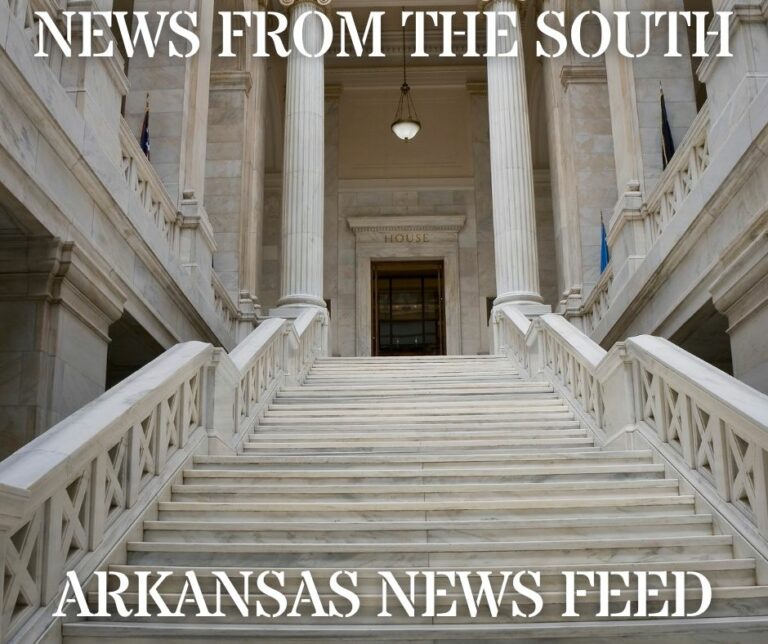News from the South - Tennessee News Feed
Report: Climate change made April flooding, severe storms 9% more intense
by Cassandra Stephenson, Tennessee Lookout
May 9, 2025
The effects of climate change made severe flooding that inundated West Tennessee and parts of the Central Mississippi River Valley in early April about 9% more intense, according to an analysis published Thursday by an international team of environmental researchers.
From April 3 through April 6, thunderstorms and torrential downpours hovered over a broad swath of the Mississippi River Valley, leading to near-record breaking floods, widespread damage and at least 15 deaths.
Those four days of rainfall are the heaviest recorded for the region in spring since 1950, according to the report published by World Weather Attribution, an international collaboration that analyzes the potential influence of climate change on extreme weather events.
The study used observational data, historical records and climate models to examine how warming temperatures impact storm likelihood and intensity. Researchers also used nonprofit Climate Central’s Ocean Climate Shift Index tool — based on observations and climate model data — to analyze sea surface temperatures in the Gulf of Mexico where much of the moisture fueling the storm originated, said Ben Clarke, a researcher at the Centre for Environmental Policy at Imperial College London.
Researchers compared how this type of weather event has changed between today’s climate — about 1.3 degrees Celsius hotter due to warming caused by use of fossil fuels and deforestation — compared to a cooler, pre-industrial climate (1850-1900).
“When we combine the evidence, we do find an overall increasing trend in such extremes,” Clarke said. “Similar events have become, we estimate, about 40% more likely, or, equivalently, about 9% more intense.”
Clarke noted that some climate models used in the study showed a more “mixed picture” of the effects of warmer temperatures, meaning the study’s results are “likely a conservative estimate.”
While the methods used in this study are peer-reviewed, the study itself was released in the immediate aftermath of the severe weather event and has not yet been peer-reviewed itself, Clarke said.
Early warnings likely saved lives, researchers say
Over four days in early April, eight states saw “relentless amounts of rain” ranging from six to 12 inches, with some locations exceeding 16 inches, Climate Central Weather and Climate Engagement Specialist Shel Winkley said.
The rain fell on soil that was already saturated from late-winter rain, particularly in the Ohio River Valley, he said.
In Northwest Tennessee, the small town of Rives suffered severe flooding in February, only to flood again a few weeks later.
Winkley said a ridge of high pressure over the Carolinas, Georgia and Florida blocked the low pressure system producing the storm from pushing forward, essentially stalling the storm front to dump rainfall over the already-saturated ground.
Early warnings from the National Weather Service very likely saved lives, Bernadette Woods-Placky, Climate Central’s chief meteorologist, said.
In Obion County, Tennessee, more than 100 families evacuated their homes during the event. Nearby Dyer County issued a mandatory evacuation for residents of Bogota on April 7 in anticipation of additional flooding.
Woods-Placky noted that layoffs and firings were beginning to roll out in National Weather Service offices across the U.S. as part of cost-cutting measures under the Trump administration around the time these floods were happening.
“This is an example of how critical these employees are and why recent workforce cuts risk undermining their ability to keep people safe and prepared,” she said.
Winkley said post-storm analyses like this are vital for protecting public safety in future events.
“It helps us really understand, is this going to be a place that’s livable in the future, and if it is, how do we make sure that it’s livable and safe?” he said.
Study: ‘Generational’ storms could become more likely
The 96-hour rain event was the second-highest on record for the Obion, Forked Deer and Loosahatchie Rivers (all Mississippi River tributaries), according to the U.S. Army Corps of Engineers.
Dyersburg, Tennessee — the county seat of Dyer County — is prone to flooding from the North Fork of the Forked Deer River.
Early April’s flooding marked the third-highest flood in the town’s history, according to Mayor John Holden, who has held the position for 19 years.
The worst flood in Dyersburg’s history occurred in 2010, wiping out multiple homes and trailer parks. The second-highest flood record was set in 1937.
Historical data indicates downpours like this are “expected to occur, on average, about once a century in today’s climate with 1.3 degrees Celsius of warming,” the report states.
Before the storms rolled in, the National Weather Service’s Weather Prediction Center warned the public of “generational” rainfall totals.
But the study’s authors caution that further warming could increase the likelihood that these events will no longer be expected just once in a generation.
“If warming reaches 2.6 degrees Celsius (4.7 degrees Fahrenheit), which is expected by 2100 under current policies, four-day spells of rainfall are expected to become a further 7% more intense and twice as likely,” according to a study summary.
“This is a good moment to remember that we are a water planet, and a warmer atmosphere forces more evaporation, so our atmosphere in general has more water to come down whenever there’s a trigger, wherever there’s a trigger,” Woods-Placky said. “So that’s why we’re seeing an overall increase in heavy rain events, even to places that may not be getting wetter. The distribution of how they’re getting rain is coming in these heavier buckets.”
What does higher intensity mean?
Tennessee, Kentucky and Arkansas were hardest hit by the early April storms, and each state requested a major disaster declaration to access FEMA assistance.
Damage estimates for public property and recovery in West and Middle Tennessee exceed $26 million, according to post-storm assessments. State and local officials believe this will meet the eligibility threshold for federal public aid. Tennessee has yet to receive a decision from the Trump administration.
The administration approved a major disaster declaration for Kentucky on April 24. Arkansas Gov. Sarah Sanders requested a major disaster declaration to cover the April storms on May 3. Trump denied Sanders’ earlier request for major disaster aid following storms and tornadoes in March.
West Tennessee picks up pieces, awaits FEMA decision after severe storms
The Tennessee Emergency Management Agency estimates around 300 homes and 14 businesses or nonprofits were severely damaged. West Tennessee mayors report hundreds of acres of flooded farmland.
To illustrate the significance of the storm’s 9% higher intensity that the study attributes to climate change, Imperial College London Centre for Environmental Policy Senior Climate Science Lecturer Friederike Otto refers to a separate study on Hurricane Helene.
That study, published by the Grantham Institute of Climate Change and the Environment in 2024, estimated that a roughly 11% increase in wind speed due to climate change accounted for about 44% of the storm’s damage in coastal Florida.
Essentially, Otto said, the increase in intensity by 10% could nearly double the cost of damage.
“If that hits you (the region) once in a lifetime, I mean … that’s one thing,” Otto said. “But if that hits you twice, and it has the higher impact, that completely changes what … extreme weather can mean for a community.”
YOU MAKE OUR WORK POSSIBLE.
Tennessee Lookout is part of States Newsroom, a nonprofit news network supported by grants and a coalition of donors as a 501c(3) public charity. Tennessee Lookout maintains editorial independence. Contact Editor Holly McCall for questions: info@tennesseelookout.com.
The post Report: Climate change made April flooding, severe storms 9% more intense appeared first on tennesseelookout.com
Note: The following A.I. based commentary is not part of the original article, reproduced above, but is offered in the hopes that it will promote greater media literacy and critical thinking, by making any potential bias more visible to the reader –Staff Editor.
Political Bias Rating: Center-Left
The content emphasizes the impact of climate change on severe flooding and highlights scientific research linking increased storm intensity to human-caused warming. It includes critiques of policy decisions, such as workforce cuts at the National Weather Service during the Trump administration, which aligns with concerns often raised by center-left perspectives about environmental regulation and government resource allocation. The article is fact-focused and supported by scientific studies, but its framing suggests a leaning toward advocacy for stronger climate action and government responsibility in disaster management, characteristic of a center-left bias.
News from the South - Tennessee News Feed
Tennessee lawmakers respond to Trump’s push to eliminate mail-in ballots
SUMMARY: President Donald Trump is advocating to ban mail-in ballots and voting machines, claiming without evidence that mail-in voting leads to fraud. He urges Republicans to support a shift to paper ballots only, aiming to sign an executive order before the 2026 midterms. Tennessee Republicans, including Sen. Joey Hensley and Rep. Tim Rudd, back Trump, citing election security and strict absentee ballot rules requiring valid reasons. Conversely, Democrats like Rep. John Ray Clemmons argue the plan undermines democracy and voter rights, noting Tennessee’s low voter turnout results from restrictive laws. The U.S. Constitution allows states to set election rules, but Congress can intervene.
Read the full article
The post Tennessee lawmakers respond to Trump's push to eliminate mail-in ballots appeared first on www.wkrn.com
News from the South - Tennessee News Feed
Tennessee National Guard to join D.C. police order
by Sam Stockard, Tennessee Lookout
August 19, 2025
Tennessee Gov. Bill Lee is dispatching National Guard troops to Washington, D.C., this week to join the president’s law enforcement takeover in the nation’s capital.
Acting on orders from President Donald Trump, the governor granted a request to help the District of Columbia National Guard with a “security mission,” spokesperson Elizabeth Johnson said.
Tennessee will join several other Republican-controlled states and send 160 Guard troops this week to D.C. “to assist as long as needed,” according to Johnson. They will work with local and federal law enforcement agencies on monument security, community safety patrols, federal facilities protection and traffic control, she said.
The Tennessee Guard deployment will be funded and regulated by the federal government.
At least four other Republican governors are sending nearly 1,000 National Guard troops to D.C. after Trump activated 800 D.C. soldiers.
Trump ordered the federal takeover of Washington, D.C., law enforcement despite opposition from local officials who said crime is down some 30%.
Following a legal challenge by D.C. officials, the Trump administration backed off appointing a federal official to head the department and agreed to leave the city’s police chief in command. U.S. Attorney General Pam Bondi, though, told local police to work with federal officers on immigration enforcement even if city laws are conflicting.
Lee also said he would deploy National Guard troops to provide logistical help with Immigration and Customs Enforcement officers in Tennessee so they can spend more time on deportation.
Democratic state Rep. John Ray Clemmons of Nashville accused the governor of “uprooting” Guard personnel from their families to distract people from Trump’s “refusal to release the Epstein files,” a reference to the Jeffrey Epstein sex trafficking investigation and whether Trump is mentioned in the documents.
Clemmons pointed out violent crime in D.C. decreased by 26% this year while overall crime is down by 7%.
“If Trump was serious about addressing crime in D.C., all he and Congress have to do is better support and fund D.C. police, as they have the power to do, rather than militarize one of the most beautiful cities in America,” Clemmons said.
YOU MAKE OUR WORK POSSIBLE.
Tennessee Lookout is part of States Newsroom, a nonprofit news network supported by grants and a coalition of donors as a 501c(3) public charity. Tennessee Lookout maintains editorial independence. Contact Editor Holly McCall for questions: info@tennesseelookout.com.
The post Tennessee National Guard to join D.C. police order appeared first on tennesseelookout.com
Note: The following A.I. based commentary is not part of the original article, reproduced above, but is offered in the hopes that it will promote greater media literacy and critical thinking, by making any potential bias more visible to the reader –Staff Editor.
Political Bias Rating: Left-Leaning
The content presents a critical view of Republican actions, particularly focusing on Tennessee Governor Bill Lee and former President Donald Trump’s deployment of the National Guard to Washington, D.C. It emphasizes opposition from Democratic officials and highlights concerns about militarization and distraction from other issues. The article’s framing and choice of quotes suggest a perspective that leans toward the left side of the political spectrum, critiquing conservative policies and leadership decisions.
News from the South - Tennessee News Feed
Survey shows Tennessee teachers’ feelings about cell phones, disciplinary measures and school culture
SUMMARY: A recent Tennessee Education Survey of nearly 40,000 teachers reveals most middle and high school teachers find cellphone use disruptive, with 73% reporting cheating via phones. While 94% say schools restrict phone use during class, half of high school teachers want a full campus ban. A new state law bans wireless devices during instruction but lets districts set specific rules. Teacher retention is driven mainly by school culture, despite only a third being satisfied with pay. Most teachers support current discipline methods and evaluations, with early-career teachers spending more time on discipline but generally satisfied with evaluations improving their teaching.
Read the full article
The post Survey shows Tennessee teachers’ feelings about cell phones, disciplinary measures and school culture appeared first on wpln.org
-
News from the South - Tennessee News Feed5 days ago
GRAPHIC VIDEO WARNING: Man shot several times at point-blank range outside Memphis convenience store
-
News from the South - Texas News Feed4 days ago
Kratom poisoning calls climb in Texas
-
News from the South - Texas News Feed2 days ago
New Texas laws go into effect as school year starts
-
News from the South - Florida News Feed2 days ago
Floridians lose tens of millions to romance scams
-
News from the South - Kentucky News Feed5 days ago
Unsealed warrant reveals IRS claims of millions in unreported sales at Central Kentucky restaurants
-
News from the South - Arkansas News Feed7 days ago
Idaho is losing OB-GYNs. Doctors who remain are trying to shoulder the extra burdens.
-
Mississippi Today5 days ago
‘Get a life,’ Sen. Roger Wicker says of constituents
-
News from the South - Georgia News Feed7 days ago
Cold case murder solved: Nicole Alston’s murder | FOX 5 News













































